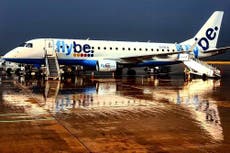Tory interventionism is going to anger Thatcherites – especially when Boris raises taxes to fund the NHS
A Tory party traditionally committed to tax cuts may have to swallow the unpalatable medicine of tax rises

The government has raised eyebrows by intervening to rescue Flybe, Europe’s biggest regional airline. On the face of it, it’s a departure from the small state conservatism to which we have become accustomed.
Yet we shouldn’t really be surprised. Boris Johnson has described himself as a “Brexity Hezza”; it was Michael Heseltine who famously promised to intervene before breakfast, lunch and dinner. At the election, Johnson promised more state aid for firms in trouble and a “Buy British” government policy after Brexit.
Johnson could not afford to allow Flybe to go under when his signature policy is to “level up” the regions. Ministers deny a bailout; that would look like the Seventies-style socialism they denounced at the election. But allowing Flybe to defer a £106m air passenger duty (APD) bill and the expected cut (APD) in next month’s budget are a barely disguised bung. Lower APD is hardly environmentally friendly when the Tories are supposedly going green.
Although ministers probably had to act quickly to save Flybe, a better policy in the medium term would be direct subsidies for specific routes poorly served by rail.
Their intervention shows that state conservatism is dying. It might soon be pronounced dead. In the budget, Sajid Javid will spend about £100bn on infrastructure projects to “level up” the north and midlands. That will be the relatively easy bit.
The hard part will follow: before a second budget and government-wide spending review in the autumn, Johnson will have to decide whether he really wants to end austerity. The pressures to spend more on public services will be immense; Javid will have little room for manoeuvre if he is to stick to the Tories’ pledges to balance the books in three years, and borrow only for investment rather than public services.
So a Tory party traditionally committed to tax cuts may have to swallow the unpalatable medicine of tax rises. To be “fair”, they would have to hit the party’s traditional supporters rather than their new working class ones. They might be seen as stealth taxes, since the Tory manifesto ruled out increasing the rate of income tax, national insurance or VAT.
Free market ministers who still idolise Margaret Thatcher wouldn’t like it. The authors of a 2012 bible for small state, economically libertarian conservatism, Britannia Unchained – Priti Patel, Dominic Raab, Liz Truss, Kwasi Kwarteng and Chris Skidmore – are all ministers under Johnson. It criticised UK workers as “among the worst idlers in the world”.
Javid shared some of their instincts. As business secretary, he ordered his officials not to use the phrase “industrial policy”. Now he champions “levelling up”, which will require directing investment away from London and the southeast to less prosperous regions. Javid’s change of tack symbolises the journey the Tories are on.
Many grassroots Tories will be wary of a big state approach. Six out of 10 members say they support a One Nation stance but are distrustful of interventionist politics and fear the government will stray too far from conservative principles, according to a ConservativeHome survey.
Between the first and second budgets, ministers expect a big, and potentially divisive, debate about the Tories’ future direction. Johnson may find it harder to hold his party’s factions together once the unifying glue of Brexit disappears.
He will likely splash the cash on the NHS and education in the party’s new working class strongholds. The message from his new band of Tory MPs in the north and midlands will surely be that shiny bridges and new roads will not be enough. Voters will care more about the state of their hospitals, GP surgeries and schools.
It will be very hard to clear the deficit in three years. A long overdue social care policy will cost billions. Future cuts in national insurance contributions, billed as helping the low paid, will have to be budgeted for. With an isolationist in the White House, there will be pressure to spend more on defence.
Johnson will want to go with the grain of public opinion. According to YouGov, 57 per cent of people, and 54 per cent of last month’s Tory voters, think higher spending on services like health and education is more important than tax cuts.
His apparent conversion to an active state will pose a dilemma for whoever succeeds Jeremy Corbyn as Labour leader. Dark warnings about a return to Thatcherism, which Labour tried at the election, will not wash. Labour will need some new tunes. Its dividing line should be green, as there will be a limit to Tory interventionism to tackle the climate emergency, as Matt Hancock’s “carry on flying” message showed today.
But Labour should not lazily assume that voters won’t buy Johnson’s new conservatism. Ominously for Labour, it will make it much harder for the party to regain the “red wall” of seats that turned blue last month.



Join our commenting forum
Join thought-provoking conversations, follow other Independent readers and see their replies